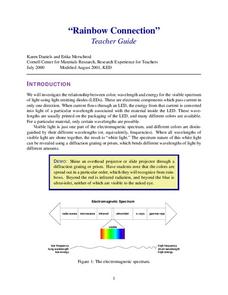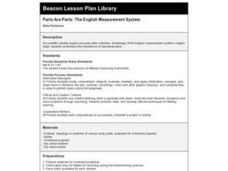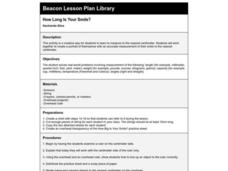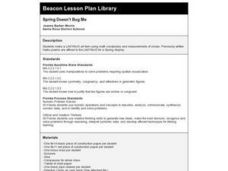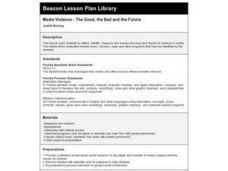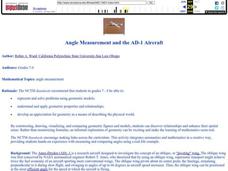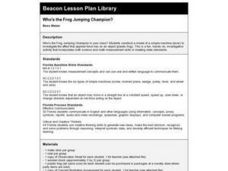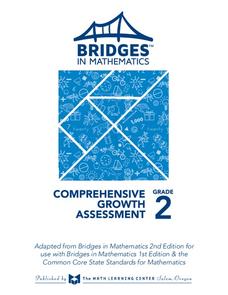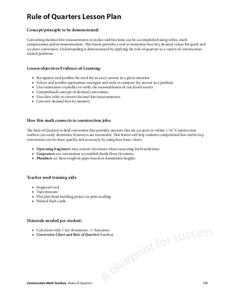University of the Desert
Tackling Extremism
Given examples of modern terrorist attacks, learners discuss the characteristics of violent extremists and what measures are currently being taken to prevent attacks by such groups.
Cornell University
LEDs Rainbow Connection
View LED lights through the eyes of a scientist. Young scholars learn to view light as a wave frequency and connect various frequencies to different colors on the light spectrum. A lab activity asks groups to measure the frequency of...
PBS
Four Corners
It's imperative to be as precise as possible. Future engineers learn about precision by building a cardboard machine. The base, corners, handles, and paddles must all be assembled with precision or the machine won't work.
Curated OER
Parts Are Parts: The English Measurement System
Third graders view and measure common body parts to find a fathom, a span, and inch. They discuss the historical information about how standard English measurements came to be and why body parts can no longer be used as a standard...
Curated OER
How Long Is Your Smile?
Fourth graders measure to the nearest centimeter. They work together to create a portrait of themselves with an accurate measurement of their smile to the nearest centimeter. This is a creative way for students to explore centimeters.
Curated OER
Wrapped Up In A Kiss!
Learners use the wrapper of a Hershey's Kiss to practice estimating, predicting and measuring. They measure with centimeter rulers.
Curated OER
Monitoring Oxygen Level
Students measure oxygen percentages in room air and air exhaled after they perform various activities. They explore various websites, and record and analyze the data from the experiments.
Curated OER
Explore the Ocean
Learners explore the oceans from their origin. In this oceans activity, students read and discuss excerpts from the Book of Genesis regarding the creation of the ocean. Learners then clean up a mock oil spill, measure the volume and area...
Curated OER
Learning About Ratios: A Sandwich Study
Students gain a concrete introduction to the concept of ratios. They demonstrate the ability to create ratios using peanut butter and jelly. They, in groups, construct 6 different sandwiches using different amounts of each food.
Curated OER
Pacing a Gunther Chain
Students pace a Gunther Chain, a measurement used by foresters to determine distance and area. They discuss that pacing is individualized depending on age, gender, etc. They practice to find an average pace. Teams estimate, pace and...
Curated OER
Spring Doesn't Bug Me
Pupils make a ladybug art item using math vocabulary and measurements of circles. Ladybugs are made using a compass. Once the bug is complete, attach a previously-written Haiku to it.
Curated OER
Media Violence - The Good, the Bad and the Future
Third graders define, identify, measure, and assess the level and impact of violence in media. The media forms evaluated include music, sitcoms, news, and other programs that are identified and shared by the class.
The Digits
Telling Time: The Digits
Time to teach your students how to read a clock? This resource is here to help! Engaging young mathematicians with two fun videos and a series of hands-on activities, these lessons offer a multimedia approach to teaching this important...
Curated OER
Angle Measurement and the AD-1 Aircraft
Students represent and solve problems using geometric models and apply geometric properties and relationships. They also practice constructing and measuring angles. By constructing, drawing, visualizing, and comparing geometric figures...
Curated OER
Ruler and Magnifying Fun
First graders investigate objects using rulers and magnifying glasses. They record their observations using a data-recording sheet and write a characteristic for each item they observe. They use the ruler to solve math problems.
Curated OER
Who's the Frog Jumping Champion?
Students use a simple machine (a lever) to launch a plastic frog. students determine who is able to make their frog "jump" the farthest and graph the results.
Curated OER
Who Has Seen the Wind?
Students investigate the characteristics of wind. For this weather lesson, students use poetry and van Gogh's paintings to discuss the movement of wind. Students are introduced to the Beaufort Scale and use the tool to measure the wind...
Curated OER
Making/Building Kites
Students explore kite making. For this cross curriculum fine arts and ancient Chinese history lesson, students activate prior knowledge about how kites were used in ancient Chinese culture. Students sketch an original kite design, then...
Bridges In Mathematics
Grade 2 Comprehensive Growth Assessment
Need to know if your students comprehend all the Common Core standards covered in second grade? This growth assessment will let you know. Find out if your second graders can add/subtract, tell the time, read a bar graph, know their...
Curated OER
Pumpkin Play
Have you ever examined a pumpkin and estimated the number of lines it has? In this math lesson, students count the actual number of lines, record and graph the results. They investigate the circumference, weight and buoyancy of the...
Curated OER
Osmosis and the Cell Membrane-part 2
Young scholars participate in a review of diffusion and the basic properties of the cell membrane before exploring the process of osmosis in a lab activity. Using shell-less eggs that have soaked in various solutions, students make...
Curated OER
Rule of Quarters
Young scholars memorize four key decimal values for quick and accurate conversion. They convert decimal foot measurements to inches and fractions using math tables, computation or memorization. They memorize decimal foot conversions.
Curated OER
Water Wonders
Students measure the amount of surface tension using a balance scale after a classroom demonstration students diagram the appearance of several liquids and label them.
Curated OER
Plotting a Hurricane Using Latitude and Longitude
Learners define and use "absolute location," latitude, and longitude. They locate on a map or globe the Earth's poles, circles, tropics, and beginning points of measurements for latitude and longitude.



